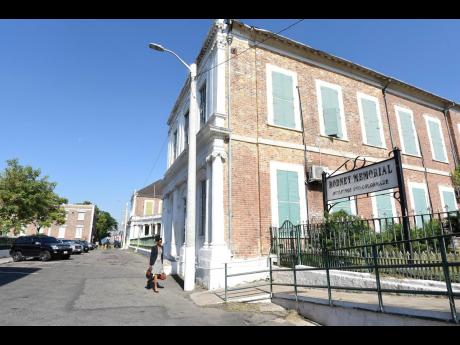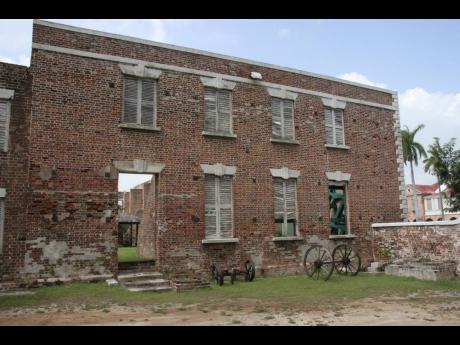David Salmon | Spanish Town urban renewal: opportunities for development
While travelling through the streets of old Spanish Town, visitors are greeted by the echoes of a city slowly decaying with the passage of time. Less than a decade ago, the town was labelled the ‘Valley of Death’ due to the flare-up of violence. Now, this appropriately describes the prolonged decline of Jamaica’s former capital, with the town becoming synonymous with urban blight.
Blight has not only consumed the town’s centre but has also served as a tapestry that documents the erosion of community social cohesion. Prime Minister Andrew Holness has repeatedly emphasised the need for the urban renewal of our nation’s town centres. With his appointment of Pearnel Charles Jr as the minister for housing, urban renewal, environment, and climate change, the prime minister has reaffirmed his commitment to achieving that objective. Given that Spanish Town has been the epicentre of Jamaica’s tragic urban history, there are numerous opportunities for the implementation of sustainable community development.
For one, incorporating the town’s history is essential to any future development plans. During my trip last year to Portsmouth in the United Kingdom, I was thoroughly amazed by the local community’s successful efforts to preserve the past while monetising it as a staple for visitors. For example, old pubs and dockyards maintained their historic character despite being used by entrepreneurs as a vehicle for wealth creation. This struck me as a unique model Jamaica could adopt.
Historically, the failure to effectively coordinate stakeholders has been the primary reason for the limited success of previous urban-renewal programmes. For instance, in its report about the Inner-City Renewal Programme, the Planning Institute of Jamaica (PIOJ) noted that the initiative “showed gaps in agency coordination and accountability, community preparation for intervention…, and lack of a sustainability plan”.
Not surprisingly, it added some best practices, including community engagement and consultations through community development committees. It further emphasised the “need for a holistic approach with emphasis on community readiness, engagement and ownership, improved coordination, and monitoring of multi-agency activities”.
These lessons must be remembered with redeveloping Spanish Town. It is on that basis that I propose the Spanish Town Revitalisation Programme (STRP), which would be spearheaded by a committee comprising urban planners, representatives from state agencies, local entrepreneurs, and other stakeholders.
STAGES IN COMMUNITY REVITALISATION
Actively engaging the community is crucial to the programme’s sustainability. Therefore, the first step of the STRP begins with assessing the pressing needs of residents. This includes installing utilities such as water and sewage that contribute to the health of any urban space. The town should then be subdivided into development zones with a master plan for each area.
After these zones are formulated, a comprehensive rehousing programme must be implemented in older communities in order to facilitate historical preservation and structural renovation. This would provide the opportunity for the creation of planned, sustainable communities. To limit the cost associated with simultaneously moving entire communities, salami tactics must be deployed. This means that residents would be relocated in a systematic way as their houses are renovated, repaired, or reconstructed.
Ideally, the designs of these new neighbourhoods should not deviate from the historical architectural style of the town as this adds consistency in design. This is not new as my visit to Portsmouth revealed that older communities were harmoniously incorporated into new city districts. Adopting this approach is important if Jamaica aims to have the town centre be declared a UNESCO World Heritage Site in the future.
Fourth, the creation of green spaces and no-car zones must also be a priority. Jamaica has long been plagued with the obsession of constructing a concrete structure, served by a vehicle, in almost every available space. This disadvantages pedestrians and creates a traffic nightmare in town centres. To address this issue, simply closing specific thoroughfares can significantly increase open spaces and give our communities back to pedestrians.
This has already been successfully implemented in cities like Barcelona, where cars are redirected around city blocks in order to create interactive community spaces for art, businesses, cyclists, and pedestrians. Furthermore, local businesses and entrepreneurs are empowered as they benefit from the additional customers in these pedestrian zones.
At the heart of this initiative must be the empowerment of young entrepreneurs who are eager to explore new opportunities whether in heritage tourism, bartending, catering, craft making, hospitality, or offering other products and services. This programme actively contributes to Jamaica achieving the Sustainable Development Goals, including Target 8.3, which aims to “promote development-oriented policies that support productive activities, decent job creation, entrepreneurship, creativity and innovation, and encourage the formalisation and growth of micro-, small-, and medium-sized enterprises”.
By adopting the Spanish Town Revitalisation Programme, additional employment can be created in the restoration industry, construction, product manufacturing, or other affiliated industries. Jamaica must now take an active approach in creating sustainable communities. Redeveloping Spanish Town can be the first step in achieving that vision.
David Salmon is a second-year public policy and management student at The University of the West Indies and a member of the National Youth Parliament of Jamaica. To send feedback, email him at davidsalmon@live.com or tweet him @DavidSalmonJA.



